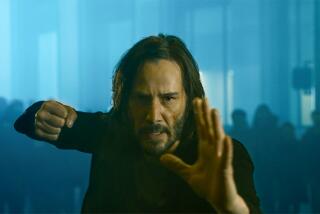China’s Top Rocker Free to Rock Again : Politics: The lifting of Beijing’s nearly three-year ban on concerts by Cui Jian is seen as a milestone.
- Share via
BEIJING — Cui Jian, the top rock star of China, stepped to the microphone in a Beijing auditorium Tuesday evening and looked out on the packed crowd of 2,700 wildly enthusiastic concert-goers.
“I haven’t seen you for a long time,” he noted. “It’s been three years. I’ve missed you.”
The audience roared its approval, as about 200 uniformed police positioned for crowd control looked on nervously.
Concerts here Monday and Tuesday, concluded without incident, mark the lifting of a nearly three-year political ban on performances by Cui before large audiences in Beijing. Cui’s reappearance in this politically repressed capital is a milestone in China’s recovery from the trauma of the 1989 massacre that ended the Tian An Men Square pro-democracy movement.
For the government, allowing Cui to perform reflects renewed self-confidence that the Communist Party is not about to be overthrown. For young people who supported the 1989 movement, Cui’s concerts mean that recent high-level personnel shifts at the Ministry of Culture and other government organs are being reflected at the grass-roots level in a much desired loosening of cultural controls.
Authorities had allowed Cui one previous large concert in Beijing after the crackdown, a performance that was part of a tour to raise money for the 1990 Asian Games. But they lost their nerve and aborted the tour after seeing the enthusiasm of his crowds and Cui’s own untamed spirit. After that, although Cui was allowed to give some concerts in provincial cities, he was limited in Beijing to infrequent appearances at private dance parties.
With tickets priced at $17, more than a week’s pay for all but the most prosperous residents of Beijing, this week’s two concerts were almost certainly the most expensive ever aimed at a mass audience here. Scalpers on the street were asking $85. In a charity gesture by Cui that presumably had something to do with him winning permission to perform, all proceeds went to the China Cancer Research Foundation.
Cui’s music is a rough kind of rock that seems to meld influences from such widely varying sources as the tough peasant ballads of northwest China, the throaty voice and poetic vision of Bob Dylan and the raw energy of John Lennon’s most hard-driving creations. Cui’s songs had the audience out of its seats most of the evening, clapping hands over heads, swaying to the beat and often singing along.
Between numbers, Cui delivered cryptic comments, the stuff of poetry, in a conversational manner. Cui, 31, walks a thin line in both his music and his words, seeking to retain his credibility as a true voice for China’s counter-culture while keeping his message vague enough to stay out of trouble with the authorities.
One of his songs, “The Last Bullet,” might be just an anti-war ballad. But for those who lived through the 1989 protests--in other words, most of his audience in Beijing--the words carry a profound poignancy:
A flying bullet hit my chest.
At that moment, my heart filled with memories of the past.
I have tears but no sorrow.
If this is the last bullet, I’m willing to accept this great glory.
I don’t know how many words I still haven’t spoken.
I don’t know how much happiness I still haven’t felt.
I don’t know how many people are the same as me.
I don’t know how many last bullets there will be.
More to Read
Sign up for Essential California
The most important California stories and recommendations in your inbox every morning.
You may occasionally receive promotional content from the Los Angeles Times.












